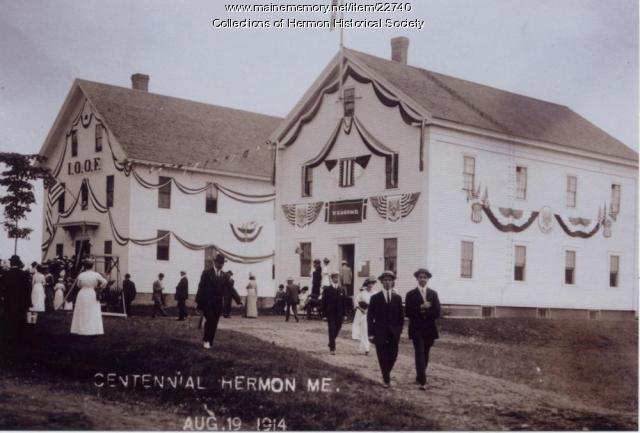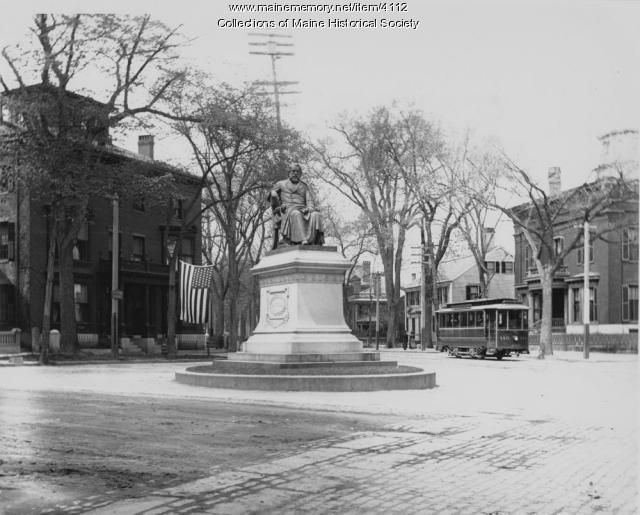Keywords: Paste
- Historical Items (121)
- Tax Records (0)
- Architecture & Landscape (1)
- Online Exhibits (62)
- Site Pages (190)
- My Maine Stories (50)
- Lesson Plans (5)
Lesson Plans
Your results include these lesson plans. Your results include these lesson plans.
Lesson Plan
Building Community/Community Buildings
Grade Level: 6-8
Content Area: Social Studies
Where do people gather? What defines a community? What buildings allow people to congregate to celebrate, learn, debate, vote, and take part in all manner of community activities? Students will evaluate images and primary documents from throughout Maine’s history, and look at some of Maine’s earliest gathering spaces and organizations, and how many communities established themselves around certain types of buildings. Students will make connections between the community buildings of the past and the ways we express identity and create communities today.
Lesson Plan
Grade Level: 3-5
Content Area: Health Education & Physical Education, Social Studies
This lesson plan will introduce students to myriad communities in Maine, past and present, through the universal lens of sports and group activities. Students will explore and understand the history of many of Maine’s recreational pastimes, what makes Maine the ideal location for some outdoor sports, and how communities have come together through team activities throughout Maine’s history.
Lesson Plan
Wabanaki Studies: Stewarding Natural Resources
Grade Level: 3-5
Content Area: Science & Engineering, Social Studies
This lesson plan will introduce elementary-grade students to the concepts and importance of Traditional Ecological Knowledge (TEK) and Indigenous Knowledge (IK), taught and understood through oral history to generations of Wabanaki people. Students will engage in discussions about how humans can be stewards of the local ecosystem, and how non-Native Maine citizens can listen to, learn from, and amplify the voices of Wabanaki neighbors to assist in the future of a sustainable environment. Students will learn about Wabanaki artists, teachers, and leaders from the past and present to help contextualize the concepts and ideas in this lesson, and learn about how Wabanaki youth are carrying tradition forward into the future.
Lesson Plan
Primary Sources: Healthcare History in Maine
Grade Level: 6-8, 9-12
Content Area: Social Studies
This lesson plan will give students the opportunity to read and analyze letters, literature, and other primary documents and articles of material culture from the MHS collections relating to how people in Maine have given and received healthcare throughout history. Students will discuss the giving and receiving of medicines and treatments from the 18th-21st centuries, the evolving role of hospitals since the 19th century, and how the nursing profession has changed since the Civil War. Students will also look at how people and healthcare facilities in Maine have addressed epidemics in the past, such as influenza and tuberculosis, and what we can learn today from studying the history of healthcare and medicine.
Lesson Plan
Longfellow Studies: An American Studies Approach to Henry Wadsworth Longfellow
Grade Level: 6-8, 9-12
Content Area: English Language Arts, Social Studies
Henry Wadsworth Longfellow was truly a man of his time and of his nation; this native of Portland, Maine and graduate of Bowdoin College in Brunswick, Maine became an American icon. Lines from his poems intersperse our daily speech and the characters of his long narrative poems have become part of American myth. Longfellow's fame was international; scholars, politicians, heads-of-state and everyday people read and memorized his poems. Our goal is to show that just as Longfellow reacted to and participated in his times, so his poetry participated in shaping and defining American culture and literature.
The following unit plan introduces and demonstrates an American Studies approach to the life and work of Longfellow. Because the collaborative work that forms the basis for this unit was partially responsible for leading the two of us to complete the American & New England Studies Masters program at University of Southern Maine, we returned there for a working definition of "American Studies approach" as it applies to the grade level classroom. Joe Conforti, who was director at the time we both went through the program, offered some useful clarifying comments and explanation. He reminded us that such a focus provides a holistic approach to the life and work of an author. It sets a work of literature in a broad cultural and historical context as well as in the context of the poet's life. The aim of an American Studies approach is to "broaden the context of a work to illuminate the American past" (Conforti) for your students.
We have found this approach to have multiple benefits at the classroom and research level. It brings the poems and the poet alive for students and connects with other curricular work, especially social studies. When linked with a Maine history unit, it helps to place Portland and Maine in an historical and cultural context. It also provides an inviting atmosphere for the in-depth study of the mechanics of Longfellow's poetry.
What follows is a set of lesson plans that form a unit of study. The biographical "anchor" that we have used for this unit is an out-of-print biography An American Bard: The story of Henry Wadsworth Longfellow, by Ruth Langland Holberg, Thomas Y. Crowell & Company, c1963. Permission has been requested to make this work available as a downloadable file off this web page, but in the meantime, used copies are readily and cheaply available from various vendors. The poem we have chosen to demonstrate our approach is "Paul Revere's Ride." The worksheets were developed by Judy Donahue, the explanatory essays researched and written by the two of us, and our sources are cited below. We have also included a list of helpful links. When possible we have included helpful material in text format, or have supplied site links. Our complete unit includes other Longfellow poems with the same approach, but in the interest of time and space, they are not included. Please feel free to contact us with questions and comments.






